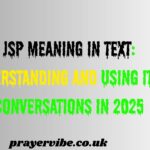In today’s fast-paced digital world, abbreviations like “JSP” play a key role in simplifying communication across text messages and social media platforms. As texting evolves into a blend of speed and clarity, shortcuts like “JSP” help convey messages quickly without losing meaning.
Knowing what “JSP” stands for can enhance how you interact in both casual and professional settings. It reflects how language adapts to modern communication trends. Whether you’re chatting with friends or networking online, proper usage of such terms boosts your effectiveness.
“JSP” is more than just a trend—it’s part of a larger shift toward digital efficiency. Understanding its meaning and context prevents miscommunication. This guide helps you master “JSP” and similar terms for smarter texting.
🙏 Divine Prayer Generator
Select a prayer category to begin
What Does “JSP” Mean in Text?

“JSP” serves as a versatile abbreviation in digital communication, with its meaning largely dependent on the context in which it’s used. The most common interpretations include:
Just Saying Please – This interpretation represents the most frequent usage of “JSP” in casual texting. It functions as a polite way to offer opinions, suggestions, or observations without appearing pushy or demanding. When someone uses “JSP” in this context, they’re essentially saying they’re sharing their thoughts respectfully and hoping the recipient will consider their perspective.
Just Some People – In discussions about groups or general populations, “JSP” can refer to “Just Some People.” This usage typically appears when someone wants to make a point about certain individuals without being too specific or direct. It’s often used in conversations about social observations or general commentary.
Java Server Pages – In technical and programming contexts, “JSP” refers to Java Server Pages, a technology used in web development. This meaning is specific to IT professionals, developers, and technical discussions, making it quite different from the casual texting interpretations.
The key to understanding “JSP” lies in reading the surrounding context. The tone of the conversation, the relationship between communicators, and the topic being discussed all provide clues about which interpretation applies. Misunderstanding the intended meaning can lead to confusion, making it essential to consider these contextual factors.
Modern texting culture has created an environment where multiple meanings can coexist for the same abbreviation. This flexibility allows for creative expression but also requires users to develop strong contextual reading skills to avoid miscommunication.
Polite Alternatives to “JSP” in Text
When engaging in respectful communication, especially with acquaintances, colleagues you don’t know well, or in semi-formal situations, using clear and courteous language helps maintain positive relationships. Here are thoughtful alternatives to “JSP”:
“I respectfully suggest considering this”
This phrase maintains formality while offering suggestions in a non-confrontational manner.
“This is just my perspective, feel free to disagree”
Acknowledging that others may have different viewpoints shows emotional intelligence and respect.
“I hope you don’t mind me sharing this thought”
This approach seeks permission before offering opinions, demonstrating consideration.
“Please take this as a friendly suggestion”
Emphasizing the friendly nature of your input helps maintain positive relationships.
“I’m sharing this with the best of intentions”
This alternative clarifies your motivations, reducing the chance of misinterpretation.
Example:
Text: “You should probably double-check those numbers. JSP.”
Polite Alternative: “You might want to review those numbers when you have a chance. I’m sharing this with the best of intentions.”
The polite alternative transforms a potentially blunt statement into a considerate suggestion that maintains the relationship while conveying the same essential message.
Professional Alternatives to “JSP” in Text
Professional communication requires a higher level of formality and clarity. When texting or messaging in workplace contexts, using precise language that reflects professionalism while remaining approachable is crucial. Consider these professional alternatives:
“I would like to propose this for your consideration”
This formal approach shows respect for the recipient’s decision-making authority.
“This suggestion might be worth exploring”
Presenting ideas as possibilities rather than directives maintains professional courtesy.
“I recommend reviewing this approach”
Direct but respectful, this alternative clearly states your professional opinion.
“For your review and consideration”
This phrase is commonly used in business communication to present information formally.
“I believe this perspective merits discussion”
This alternative invites dialogue and collaboration rather than imposing ideas.
Example:
Text: “We need to change our marketing strategy. JSP.”
Professional Alternative: “I would like to propose reviewing our current marketing strategy. This suggestion might be worth exploring in our next team meeting.”
The professional version provides more context, suggests a proper forum for discussion, and presents the idea as a collaborative opportunity rather than a demand.
Casual Alternatives to “JSP” in Text

Casual conversations with friends, family members, and close acquaintances allow for more relaxed and expressive language. These informal alternatives maintain the conversational flow while expressing similar sentiments:
“Just my two cents”
This classic phrase indicates you’re offering an opinion without expecting it to be taken as absolute truth.
“No offense, but”
This preface acknowledges that your statement might be sensitive while clarifying your intention isn’t to hurt feelings.
“Don’t hate me for saying this”
A playful way to introduce potentially controversial opinions in friendly conversations.
“Just putting it out there”
This casual phrase indicates you’re sharing thoughts without strong attachment to outcomes.
“Take it or leave it”
This alternative shows you’re offering something without pressure for acceptance.
Example:
Text: “That restaurant is totally overrated. JSP.”
Casual Alternative: “That restaurant is totally overrated. Just my two cents, but I think there are way better places in town!”
The casual alternative maintains the opinion while adding personal context and showing respect for differing tastes.
Choosing the Best Alternative Based on Tone and Context
Selecting appropriate alternatives requires understanding your audience, the communication platform, and the relationship dynamics involved. Consider these factors when choosing how to express yourself:
Relationship Level: Close friends and family members typically appreciate direct, casual communication, while professional contacts prefer more formal approaches. New acquaintances fall somewhere in between, requiring polite but not overly formal language.
Platform Context: Professional messaging platforms like Slack or Microsoft Teams call for more formal language, while personal texting apps allow for casual expression. Social media comments often require a middle-ground approach.
Topic Sensitivity: Controversial or personal topics require more careful language, regardless of the relationship level. Using softer alternatives helps prevent misunderstandings and maintains positive communication.
Cultural Considerations: Different cultural backgrounds may interpret directness differently. When in doubt, choosing more polite alternatives helps ensure your message is well-received across cultural boundaries.
Time Constraints: In urgent situations, clarity trumps formality, but maintaining respect remains important even when time is limited.
Texting Examples Optimized for Google
Here are practical examples showing how to use JSP alternatives effectively across different scenarios:
- Friend Group Chat: “We should totally check out that new coffee shop downtown. Just putting it out there for our weekend plans!”
- Work Team Message: “I recommend we consider extending the project deadline by one week. This suggestion might be worth exploring given our current resource constraints.”
- Family Text: “Mom’s lasagna recipe is still the best I’ve ever had. No offense to other family cooks, but that’s just my opinion!”
- Social Media Comment: “I respectfully disagree with this approach. This is just my perspective, feel free to share your thoughts too.”
- Colleague Direct Message: “For your review and consideration: I believe adjusting our meeting schedule might improve attendance rates.”
- Close Friend: “That movie was way too hyped. Don’t hate me for saying this, but I fell asleep halfway through!”
- Professional Email: “I would like to propose this alternative solution for your consideration. I believe this perspective merits discussion in our upcoming review.”
- Casual Group Discussion: “Just my two cents, but I think we’re overcomplicating this whole situation.”
- Workplace Suggestion: “This suggestion might be worth exploring: implementing a flexible work-from-home policy could boost team morale.”
- Social Gathering Planning: “Take it or leave it, but I think we should order pizza instead of cooking tonight!”
Conclusion
Understanding “JSP” and its alternatives empowers you to communicate more effectively across different contexts and relationships. While “JSP” serves as a convenient shorthand in casual texting, expanding your vocabulary with appropriate alternatives ensures your messages are received positively and understood clearly.
The key to successful digital communication lies in matching your language to your audience and context. Whether you’re texting friends, messaging colleagues, or commenting on social media, choosing the right alternative to “JSP” demonstrates emotional intelligence and communication skills.

Daniel Miller is a passionate writer, SEO expert, and blogger, specializing in Bible verses, prayers, and faith-based content at PrayerVibe.







